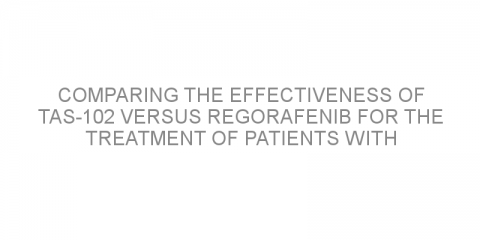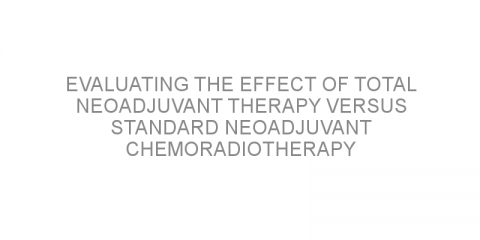In a nutshell The study evaluated the effectiveness of massage therapy for chemotherapy-induced peripheral neuropathy (CPIN) in patients with breast and gastrointestinal (GI) cancer. The main finding of the study was that intensive massage therapy 3 times a week showed promising results in these patients. Some background There are many cancer...
Read MoreColorectal cancer Posts on Medivizor
Evaluating the effectiveness and safety of adding oxaliplatin (3 months vs 6 months) to 6 months of fluoropyrimidine after surgery in patients with stage II or III colon cancer.
In a nutshell This study evaluated the effectiveness and safety of adding oxaliplatin (Eloxatin; 3 months vs 6 months) to 6 months of fluoropyrimidine therapy such as 5-Fluorouracil (Adrucil) or capecitabine (Xeloda) as adjuvant (treatment after surgery) treatment in patients with stage II or III colon cancer. The data showed that adding 3 months of...
Read MoreComparing the effectiveness of TAS-102 versus regorafenib for the treatment of patients with metastatic colorectal cancer.
In a nutshell This study compared the effectiveness of TAS-102 (Lonsurf; trifluridine-tipiracil) versus regorafenib (Stivarga) for the treatment of patients with metastatic colorectal cancer (mCRC). The data showed that TAS-102 had better oncologic outcomes than regorafenib in these patients. Some background Colorectal cancer (CRC) is one of the...
Read MoreEvaluating the health-related quality of life outcomes of second-line chemotherapy combined with either bevacizumab or cetuximab in patients with advanced colorectal cancer.
In a nutshell This study evaluated the health-related quality of life (HR-QoL) outcomes of second-line chemotherapy combined with either bevacizumab (Avastin) or with cetuximab (Erbitux) in patients with advanced colorectal cancer with wild-type KRAS. This study concluded that the HR-QoL outcomes were similar with both treatments in these...
Read MoreEvaluating the long-term effectiveness and safety of 3-month versus 6-month modified FOLFOX/CAPOX treatment after surgery in patients with stage 3 colon cancer.
In a nutshell This study evaluated the long-term effectiveness and safety of 3-month versus 6-month modified FOLFOX (5-fluorouracil, leucovorin, and oxaliplatin) or CAPOX (capecitabine and oxaliplatin) treatment after surgery in patients with stage 3 colon cancer. The data showed that 3-month modified FOLFOX/CAPOX treatment was as effective and safe as...
Read MoreEvaluating the effectiveness and safety of adding PolyPepI1018 peptide vaccine to maintenance therapy in patients with microsatellite stable metastatic colorectal cancer.
In a nutshell This study evaluated the effectiveness and safety of adding PolyPepI1018 peptide vaccine to fluoropyrimidine/bevacizumab (Avastin) maintenance therapy in patients with microsatellite stable (MSS) metastatic colorectal cancer (mCRC). The data showed that PolyPEPI1018 added to maintenance therapy was safe and associated with specific...
Read MoreEvaluating the impact of immunetherapy on COVID-19 outcomes in patients with cancer.
In a nutshell This study evaluated the impact of immune checkpoint inhibitors (ICIs) on COVID-19 outcomes in patients with cancer. The data showed that the use of ICI treatment before COVID-19 infection does not affect the disease severity or survival outcomes. This study supports the continued use of ICIs in cancer patients during the pandemic. Some...
Read MoreEvaluating the effect of total neoadjuvant therapy versus standard neoadjuvant chemoradiotherapy and planned adjuvant chemotherapy on the survival of patients with locally advanced rectal cancer.
In a nutshell This study investigated the effect of total neoadjuvant therapy (TNT) versus standard neoadjuvant chemoradiotherapy (CRT) and planned adjuvant chemotherapy on the survival of patients with locally advanced rectal cancer (LARC). The data showed that TNT did not increase survival compared with standard CRT and planned adjuvant...
Read MoreMMRD Rectal Cancers Disappear in Clinical Trial
Fourteen people no longer have stage 2 or 3 rectal cancer because of an experimental use of immunotherapy. Enrolling in a clinical trial has, for the past 25 months and counting, spared them from surgery, chemotherapy, and radiation, which are the standard treatments for colorectal cancer. [1] Fourteen people may not sound like many, but it...
Read MoreEvaluating the effectiveness and safety of immunotherapy versus standard treatment options in patients with metastatic colorectal cancer.
In a nutshell This study compared the effectiveness and safety of immunotherapy versus standard treatment options in patients with metastatic colorectal cancer (mCRC). The data showed that immunotherapy tended to improve the survival outcomes in these patients. Some background Colorectal cancer (CRC) is one of the most common types of cancer...
Read MoreComparing the effectiveness of surgery with and without oral uracil and tegafur plus leucovorin chemotherapy for patients with stage II colon cancer.
In a nutshell This study compared the effectiveness of surgery with and without chemotherapy with uracil and tegafur (Uftoral; UFT) plus leucovorin (LV; folinic acid) in patients with stage II colon cancer. This study concluded that surgery with UFT/LV chemotherapy significantly improved survival outcomes in these patients. Some...
Read MoreEvaluating the effectiveness of anatomical versus non-anatomical resection in the surgery of lung metastases in patients with colorectal cancer.
In a nutshell This study evaluated the effectiveness of anatomical resection (AR) versus non-anatomical resection (NAR) in the surgery of lung metastases for patients with colorectal cancer (CRC). The data showed AR significantly improved cancer-specific survival outcomes compared to NAR in the surgery of lung metastases for patients with CRC. Some...
Read More














